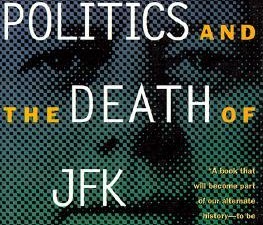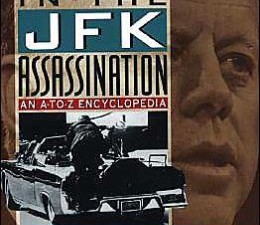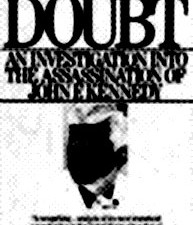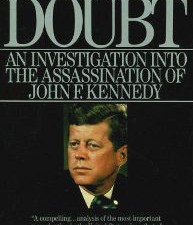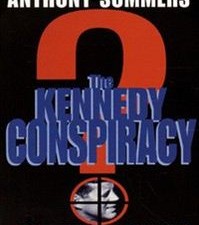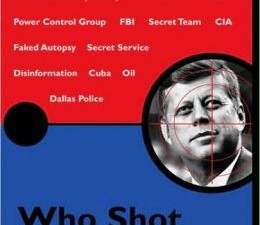Year: 2013
Deep Politics and the Death of JFK
'There is no danger of a deep state out of control in some way,' said William Hague, the UK's Foreign Secretary in June 2013, speaking about the Edward Snowden revelations. 'Which must be the first time a British minister has used the expression "deep state" in the House of Commons,' noted Robin Ramsay in Lobster #65. Hague's reference to the deep state points to the political writing of Peter Dale Scott and his concept of deep politics, first promulgated through Scott's 1993 book Deep Politics and the Death of JFK. 'Deep politics' (and you can see Scott introducing the topic in this video) is defined as 'all those political practises and arrangements, deliberate or not, which are usually repressed rather than acknowledged' (p.7). He goes on, in the preface to the paperback edition, to expand on this definition: 'A deep political system or process is one which habitually resorts to...
Who’s Who in the JFK Assassination
This wonderful idea for a book was realized in 1993, for the 30th anniversary: Who's Who in the JFK Assassination, An A-to-Z Encyclopedia, by Michael Benson, with the subtitle Information on More than 1,400 Suspects, Victims, Witnesses, Law Enforcement Officials and Investigators. Benson begins this reference work with an introduction that identifies the appeal of the assassination to be 'the sleazy slice of grotesque Americana, the labyrinth of characters and the deeply layered plot' (p.vii), which I often feel to be the story. He even refers to the case as 'hallucinatory' (p.viii). Benson's introduction is helpful, though. He directs the reader to entries appropriate for whichever assassin theory that they are interested in: for the Mafia theory, you're to look at Marcello, Trafficante, Hoffa, Giancana and Ruby; for the CIA theory, it's de Mohrenschildt, E. Howard Hunt and Marita Lorenz; for the pro-Vietnam War 'military-industrial complex' theory, it's Michael Paine,...
Reasonable Doubt (part two)
Last week we were some way into showing how Henry Hurt's Reasonable Doubt shows that Oswald did not commit murder beyond a reasonable doubt. Let doubt be our guide as we proceed... Oswald and the rifle Hurt's first quibble with Oswald's rifle shooting is that in investigative re-creations of the scenario, marksmen for both the Warren Commission (WC) and the HSCA could not fire three shots from the 6th floor of the Texas School Book Depository within the time frame and hit the targets. Was Oswald better than any of these shooters, then? (p.101). There also had to be an ammunition clip for the gun to be fired that fast, i.e. otherwise 'the cartridges must be hand-loaded, one by one' (p.103), but Hurt points out there is no mention in testimony of an ammo clip being found. The ammo itself tells a strange story, but I'm confused about Hurt's logic....
Reasonable Doubt (part one)
The other great general book about the JFK assassination is Reasonable Doubt by Henry Hurt. First published in 1986, this is the Owl Book Edition of '87. Unfortunately it's never been updated. It's more aggrieved in tone than The Kennedy Conspiracy, but then, Anthony Summers isn't American. 'Reasonable doubt' is 'the standard of evidence required to validate a criminal conviction in most adversarial legal systems' (Wikipedia). Under this standard, the defence doesn't have to provide an alternate explanation for how the crime happened, it only has to pick holes in the prosecution case. Hurt picks holes in the official (Warren Commission & HSCA) versions of the JFK assassination, and although his book isn't explicit about this, the first 7 chapters are enough to raise reasonable doubt and acquit Oswald of all charges. A second meaning to the title is that by raising so many questions and pointing out so many...
The Kennedy Conspiracy
This week, I present one of the best general books on the assassination, The Kennedy Conspiracy by Anthony Summers. The title does not 'reflect a set view by the author' (p. ix). It remains open-minded about the lone assassin and about conspiracy theories. It rigorously hunts for the 'true facts' (p.361), and although it produces 'no solutions' (p.378), it is a readable, fascinating and commendable work. Originally published in 1980, in the aftermath of the House Select Committee on Assassinations (HSCA) investigation, it has been published under various titles over the years (Conspiracy, Not in Your Lifetime), and this is the 'revised and updated' third edition, published in 1998, the year the Assassination Records Review Board (ARRB) released its final report. (If you haven't heard of the HSCA investigation and the ARRB trawl for documents, they took place because over the years the US citizenry believed less and less in...
Who Shot JFK?
Here at Blather Sub-aqua HQ in the ice-caverns of Crete, we are watchful of the time, and are therefore very much cognisant of the forthcoming 50th anniversary of the assassination of US President John F. Kennedy (JFK), which took place in Dallas, Texas, on 22 November 1963. As no-one was ever tried for this violent crime, it's a murder mystery of sorts, and has been a remarkably fertile ground for conspiracy theories for decades. Indeed it was the beginning of the conspiracy culture as we know it today. A culture that Blather has fed off like a starving goat. From now until 22 November, this blog will prime you for the anniversary, and will be, in the beginning at least, a kind of literature survey of the case. This week's book is Who Shot JFK? (2002), a 'pocket essential' by Robin Ramsay, editor of the parapolitical journal Lobster. There is...

